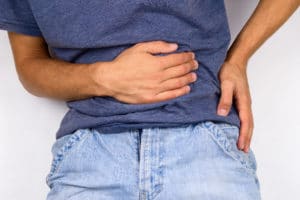
But what most patients are surprised to find out about Dr. Jensen is his extensive expertise in various gastrointestinal surgeries. One of those is laparoscopic hernia repair surgery. As we head into another fall in Utah and a good time to recuperate, let’s devote this blog to that possible pain in your lower abdomen, that hernia.
How common are hernias?
Despite being relatively prevalent, hernias are not well understood by the general public. More than 600,000 hernia repair surgeries are performed every year in the U.S., making it one of the most common general surgical procedures.
It’s estimated that roughly five percent of the population will develop an abdominal wall hernia, of these 75 percent are inguinal hernias. Men are 25 times more likely to develop an inguinal hernia than are women. The right side is more typically the location compared to the left.
One of Dr. Jensen’s surgical specialties is laparoscopic hernia repair, so let’s get into a few common questions to dispel some of the mystery about hernias.
How do I know if I have a hernia?
Some hernias aren’t painful, and they show themselves with a bulge at the site. Other hernias can be painful, usually becoming worse when the person is standing, straining, or lifting heavy items. There will usually be localized swelling and soreness at the site.
With an inguinal hernia, there may be a lump on either side of your pubic bone where your groin and thigh meet. Inguinal hernias also create a weakness, pressure, or feeling of heaviness in the abdomen. There may be pain in the lower abdomen, particularly when bending over or coughing.
Is a hernia painful?
Some are; others are not. Many hernias show no symptoms and they may only be discovered during a routine physical or medical exam for an unrelated condition.
Are hernias hereditary?
Although not directly genetic, such as eye color or pattern baldness, there can be a genetic tendency to have weakness in areas of the abdomen or the inguinal canal where it doesn’t close properly after the testicles descend.
Does smoking make a hernia more likely?
Smoking, like obesity and poor nutrition, can weaken the muscles and make hernias more likely.
Does lifting a heavy object cause a hernia?
Hernias occur when a person has a combination of muscle weakness and strain. One of the causes of strain can be lifting heavy weight. But for this to cause a hernia, the person also has to have muscle weakness.
Can a hernia go away on its own?
The only type of hernia that corrects itself is the umbilical hernia. As the child’s abdominal wall muscles strengthen, they can push the small intestine back into place. Other hernias will not go away. Some may only need to be monitored, but others may require surgery to avoid possible complications.
Do you think you may have a hernia? Please call Dr. Jensen at (385) 424-4567 to schedule a consultation.
